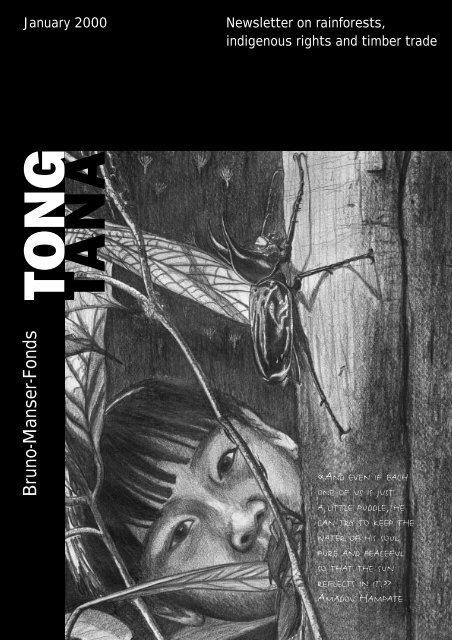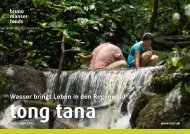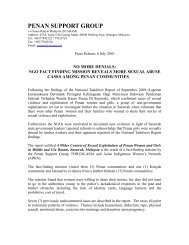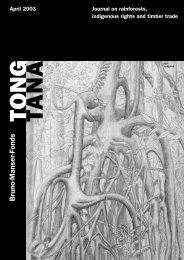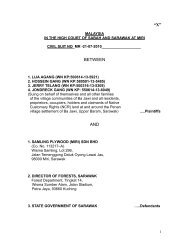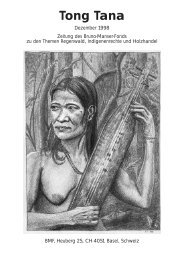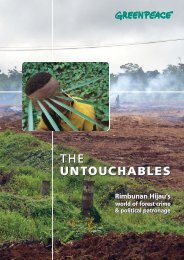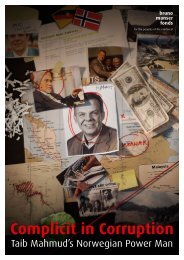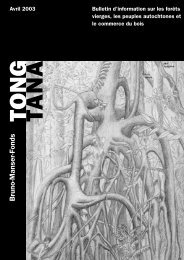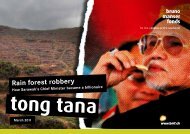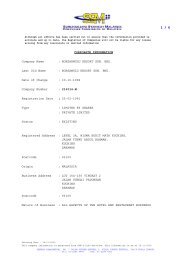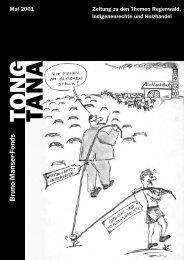Tong Tana December 1999 - Bruno Manser Fonds
Tong Tana December 1999 - Bruno Manser Fonds
Tong Tana December 1999 - Bruno Manser Fonds
Create successful ePaper yourself
Turn your PDF publications into a flip-book with our unique Google optimized e-Paper software.
January 2000<br />
Newsletter on rainforests,<br />
indigenous rights and timber trade<br />
<strong>Bruno</strong>-<strong>Manser</strong>-<strong>Fonds</strong><br />
«AND EVEN IF EACH<br />
ONE OF US IS JUST<br />
A LITTLE PUDDLE, HE<br />
CAN TRY TO KEEP THE<br />
WATER OF HIS SOUL<br />
PURE AND PEACEFUL<br />
SO THAT THE SUN<br />
REFLECTS IN IT.»<br />
AMADOU HAMPATE
Editorial<br />
2<br />
New times are dawning<br />
bm – On skis, by bike, motorbike, car, train and jet.<br />
Faster and faster we race through space. We compress<br />
time. Yi Pee! How the landscape is flying by! Being<br />
present at the other end of the world by TV, cell phone,<br />
fax, Internet, satellite. Yi Pee! For just a moment.<br />
Quick! Everywhere! Antisocial The national train service<br />
(SBB) closes public toilets because they do not pay<br />
and is starting business abroad. Merger-itis of the<br />
biggest against the rest of the world in a small unknown<br />
village far away. The market wants a free hand<br />
– anonymously! Several politicians play along: they<br />
speak of transparency and resist product declaration.<br />
They call it development and cut school subsidies because<br />
“dumb” people don’t ask questions and buy<br />
more when it’s cheaper. Others far away in the unknown<br />
village pay the difference. Yet new times are<br />
dawning. A singer sings of love, of the search for real<br />
life and of a yearning which captivates young and old<br />
alike: a yearning to become oneself – uniquely – to find<br />
one’s own treasure. McDonalds Benson & Hedges<br />
and Coke Is self-realization dependent on company<br />
brands Enough of the standard fare of the multinationals,<br />
being served every step of the way by their advertising<br />
servants, then being consumed! I now set my<br />
table using my own imagination. To share a good meal<br />
with you To snuggle up at night; the cosy company of<br />
good friends or strangers make a home. To help one<br />
another, to let yourself be helped in need. “What, you<br />
have not yet invested your assets profitably – “No! I<br />
already gave them away before the stock exchange<br />
crashed! Before others blow it all, before they throw<br />
away what I held dear, I already share now what is too<br />
much for me and what little I have left then becomes<br />
valuable.”<br />
Yesterday the postal employee paid the missing cents<br />
for the postage on my packet out of his own pocket. Today<br />
I give a stranger with no change a tram ticket. With<br />
every good deed paradise will already begin today. The<br />
reports from Sarawak are not rosy, and our work at the<br />
BMF is growing over our heads – your contribution commits<br />
us to keep going. We’re sticking with it as long as<br />
our strength and finances last. Happy new millennium!<br />
<strong>Bruno</strong> <strong>Manser</strong> and the BMF team<br />
Contents<br />
Editorial 2<br />
Sarawak - Malaysia 3–9<br />
Speaking of Wood 10<br />
Switzerland 11–14<br />
BMF internal affairs 15<br />
Penan folk tale 16<br />
“Hey, Mr. Surgeon, is the handle of your instrument by chance not<br />
made of tropical wood!”<br />
<strong>Tong</strong> <strong>Tana</strong><br />
Published by <strong>Bruno</strong>-<strong>Manser</strong>-<strong>Fonds</strong> (BMF)<br />
Association for the peoples of the rainforest<br />
Heuberg 25, CH-4051 Basel, Switzerland<br />
Telephone ++41(61)261 94 74<br />
Fax ++41(61)261 74 73<br />
e-mail: info@bmf.ch<br />
Internet: http://www.bmf.ch<br />
Editors: <strong>Bruno</strong> <strong>Manser</strong>, John Kunzli<br />
Authors: B. <strong>Manser</strong> (bm), J. Kunzli (jk), David Koechlin (dk),<br />
Dominik Bucheli (db)<br />
Photos: B. <strong>Manser</strong>, BMF, E. Bruenig, J. Schar, L.P. Chiang<br />
Drawings: B. <strong>Manser</strong>, Larissa Schönfelder<br />
Translations: R. Gogel (French), B. Jäckli (English), J. Kunzli,<br />
B. <strong>Manser</strong> (German)<br />
Edition: 6200 (4000 German, 1500 French, 700 English)<br />
Published three times a year<br />
Please note: Voluntary contributions are very welcome<br />
and much needed !<br />
Thank you! Donations:<br />
Switzerland/Liechtenstein:<br />
Post account: 40-5899-8<br />
Coop Bank account, 4002 Basel, Acct. 421329.29.00.00-5<br />
France: La Poste, Strasbourg, Acct. CCP 2.604.59T<br />
Germany: Deutsche Bank, Lörrach (BLZ 683 700 34)<br />
Acct. 1678556<br />
Printed by Gremper AG, Basel
Sarawak - Malaysia<br />
Taib Mahmud –<br />
Chief Minister without power<br />
bm – In 1987, 4700 natives of Sarawak brought 1600<br />
loggers with 210 bulldozers to a standstill for months<br />
with peaceful roadblocks in order to preserve their<br />
virgin forests with all their vitally essential resources<br />
from the wilderness. The Chief Minister Taib Mahmud<br />
replied with a hunting ban for non-residents and declared<br />
areas as biosphere reserves for the Penan. But<br />
not a soul ever took notice of Taib’s decision: up to the<br />
present day employees of the logging companies can<br />
plunder wildlife stocks unhindered using rifles and fish<br />
the indigenous peoples’ rivers empty using illegal<br />
methods, even in designated protected areas.<br />
Poachers, water pollution and violence: Lakei Suti<br />
(“the short man”), a Penan nomad from the Magoh<br />
river reports: they secretly carry out electrical fishing in<br />
our area. At the fork to the Patah river we met them<br />
with two cars loaded full of fish which they wanted to<br />
sell downriver in Limbang. At the Meli-it we saw many<br />
dead fish floating down the river one day. They had<br />
fished with poison but only took the largest, not even<br />
collecting fish as thick as a lower arm, so many were<br />
killed! When we wanted to prevent a logger from fishing<br />
in our river with a casting net, he unlocked his rifle and<br />
pointed it at close range right at my chest. We could<br />
only deflect the shot upwards into the trees through a<br />
blow on the barrel! Employees of the Ravenscourt<br />
Company (Samling Group) set many snares; many<br />
mouse deer, porcupines and argus pheasants died<br />
in them as well as one of our dogs. They shoot deer<br />
and wild boar and when the wounded animal stumbles<br />
down onto steep ground they just climb back into<br />
their car and drive off. If this continues we will soon<br />
not have any animals left! And the poison with which<br />
they spray their stored timber, their machine oil which<br />
they just pour into the ground – doesn’t the rain wash<br />
all this into the riverwater with which we make our sago<br />
and which we drink! The Raut Company had promised<br />
not to fell any wood in the protected area on the Magoh<br />
Borneo Post, July 15th, 1987<br />
river designated by the government as ours. When they<br />
nevertheless crossed the watershed with their bulldozers<br />
at the Batu Iran we took the foreman to task.<br />
He then called the manager Ling who came out of his<br />
car with a crate of Coca-Cola. He placed the crate in<br />
front of us and invited us to drink. Enraged, we threw<br />
the Coke cans down the slope one after the other. He<br />
then called for help from the forestry commissioner<br />
Kusui who came and said he was from the government.<br />
He fired a salvo of shots right over our heads<br />
from close range so that the smoke got in our noses<br />
and our ears hurt. And then Taib Mahmud and his government<br />
says we Penan have it easy! Why does he not<br />
teach his people good manners!<br />
Mobile Dental clinic: appeal to Taib<br />
“We ask our Chief Minister Taib Mahmud to accept<br />
<strong>Bruno</strong> <strong>Manser</strong>’s offer of a mobile dental clinic for us<br />
in the headwater regions so that our teeth can be<br />
mended soon,” said T.K. Kayan Etek, governmentappointed<br />
chief and Penan from the Ulu Limbang.<br />
3<br />
Ikan Cemáh
Sarawak - Malaysia<br />
4<br />
The Penan wait and hope<br />
The rough road to achieving<br />
biodiversity conservation in northeastern<br />
Sarawak<br />
bm – In 1993 the Sarawak government decided to protect<br />
1688 km 2 of forest in Lanjak Entimau (Western<br />
Sarawak) as a wildlife sanctuary with support of the International<br />
Tropical Timber Organization (ITTO) and the<br />
local population. Based on this positive and productive<br />
partnership, Sarawak and Swiss foresters worked together<br />
on a similar but much more ambitious project in<br />
Eastern Sarawak and submitted the proposal to the<br />
Sarawak Authorities in early 1998.<br />
This proposal is of local and global interest, as it links<br />
already existing National Parks and Nature Reserves in<br />
Brunei, Sarawak and Kalimantan (Indonesia) to the<br />
largest Biosphere-Area in the whole of South-East-<br />
Asia, covering 23,489 km 2 of forest and forest land<br />
that spans across three States in the interior of<br />
Borneo. Over 70% of the area has already been legally<br />
put under some kind of protection, though large parts<br />
of this area are only protected on paper (e.g. Pulong<br />
Tau and Magoh area in Sarawak). The proposed extended<br />
protected area, buffer zones and sustainable<br />
forest management areas in Sarawak include: large<br />
parts of steep mountain forest (not suitable for logging);<br />
the last remnants of dipterocarp virgin forest in<br />
the region (some of which has been proposed for<br />
protection by the government); – as well as some<br />
logged off and secondary forest areas. With the<br />
commitment of neighbouring countries, the area could<br />
still be enlarged to include some endemic bio-regions<br />
of Sabah and protected areas nearby to the total<br />
project area (the Batu Apoi-Forest Reserve in Brunei,<br />
462 km 2 , and of the Sembakung Extension in Kalimantan,<br />
5000 km 2 ).<br />
The ultimate goal of the project is to create a win-win<br />
project in the long-term for all stakeholders, including<br />
local people living in Eastern Sarawak, the Government<br />
of Sarawak and logging companies. When <strong>Bruno</strong>-<br />
<strong>Manser</strong>-<strong>Fonds</strong> was approached to comment on the proposal<br />
we were very critical that once more, indigenous<br />
peoples like the Penan may be the losers again. However,<br />
we support the project’s aim: to protect intact<br />
virgin forest within the area for biodiversity conservation<br />
and to promote the wise use of non-timberproducts<br />
by the Penan and others. This in conjunction<br />
with the implementation of sustainable timber extraction<br />
in degraded areas to bring added income to the<br />
state and all concerned parties.<br />
The project idea has gained support from Malaysian<br />
citizens, e.g. the former Director of the ITTO and<br />
the former President to the United Nations General<br />
Assembly. Even the Sarawak Timber Association (STA)<br />
recognized the importance of the project proposal. For<br />
the implementation of the project, a substantial financial<br />
commitment has already been made, which exceeded<br />
any prior grant financing in Sarawak. The World<br />
Bank, the US-Government, the Swiss Government and<br />
Japan have also shown interest in making financial<br />
contributions to the realization of the project.<br />
In April 1998 the Swiss Ambassador to Malaysia<br />
accepted an invitation by the Sarawak Government to<br />
promote the project idea, supported by many both<br />
within and outside Malaysia. The delegation was<br />
warmly received by the Chief Minister of Sarawak, who<br />
recognized the importance of biodiversity conservation<br />
and sustainable use of natural resources in the proposed<br />
project area.<br />
However, the project has not made any further steps<br />
since then. Why Essentially because one man objected:<br />
Sarawak State Secretary HAMID BUGO! As a result,<br />
today, nearly two years after the launch of the project<br />
idea, nothing has happened at all, and the forests<br />
are depleted in an even higher rate than before.<br />
The reasons why Hamid Bugo is against biodiversity<br />
conservation and the sustainable use of forest resources<br />
as promoted through this project is not<br />
known. Perhaps the Chief Minister of Sarawak has an<br />
answer, as to why he has not yet made a clear decision<br />
in favor of the people of Sarawak, who suffer from<br />
the negative impacts of destructive logging, such as<br />
landslides, pollution, local climate change, floods,<br />
droughts and forest-fires. It seems that a unique opportunity<br />
for the well-being of many is being foregone<br />
for the special interests of some. The press and<br />
Malaysian citizens should demand answers.
Proposed Biosphere Area in Eastern Sarawak in relation to already existing<br />
Protected Areas in Brunei Darussalam and Kalimantan/Indonesia<br />
Ref. Designation Country Name of Area Area km 2<br />
1 National Park Malaysia Gunung Mulu 530<br />
2 Forest Reserve Brunei D. Labi Hills, Ladan Hills 749<br />
3 Nature Reserve Indonesia Sungai Kayan, Sungai Mentarang 16’000<br />
4 Proposed Biosphere Area in Malaysia 6’205<br />
Totally border-crossing-connected Protected Area: 23’484<br />
5 Nature Reserve Indonesia Sembakung Extension 5’000<br />
6 National Park Brunei D. Batu Apoi 462<br />
7 Wildlife Sanctuary Malaysia Lanjak Entimau 1’687<br />
5<br />
Source: Protected Areas of the World, IUCN, 1991
Sarawak - Malaysia<br />
6<br />
Interview with Mutang Urud,<br />
a Sarawakian Activist living in<br />
Canadian exile<br />
<strong>Bruno</strong>: Dear Brother Mutang, tell us something about<br />
yourself!<br />
Mutang: I’m a 40-year-old Kelabit from Long Napir in<br />
Sarawak’s interior. I went to a technical college in<br />
West-Malaysia and started a business in Sarawak<br />
after graduation.<br />
B: How did you get involved in the struggle of your peoples<br />
to protect their forest<br />
M: I guess everybody with a feeling for his community<br />
would want to be involved. Since I was in business I<br />
had the freedom to visit my community and witness<br />
their struggles. Since the Government handles the situation<br />
unfairly, I had to use my experience in the city<br />
to help write petition letters and advised them how to<br />
deal with arrests and court cases. Later I founded the<br />
Sarawak Indigenous Peoples Alliance (SIPA) with the<br />
goal to unite all indigenous peoples of Sarawak who<br />
oppose logging. In the first two years we managed to<br />
visit over 45 communities in the upper Baram and Limbang<br />
area. By uniting these communities they have a<br />
stronger and more powerful voice.<br />
B: Have you been aware of the risks when you started<br />
all this<br />
M: Yes, life is full of it! One never knows what happens<br />
tomorrow, you just go where your heart tells you to. If<br />
you help people against injustices, there is no boundary.<br />
The risk I take is lesser in comparison to these<br />
people losing their traditional land forever to the corrupt<br />
and rich.<br />
B: Suddenly your life changed, you were arrested ...<br />
M: At midnight on February 5th, 1992 (just after<br />
the Chinese-New-Year-Holidays) several policemen in<br />
2 cars came to pick me up. They questioned me until<br />
4 am. Then we went back to my office where they went<br />
through all my documents until 6 am. They said that I<br />
was to be kept in custody until they knew what was<br />
happening. At that time there was a big blockade in the<br />
Baram-area that has gone on for several months and<br />
the Penan did not give in. The Police and army were<br />
ready to arrest people, but they wanted to avoid a massacre.<br />
That’s why they were asking my advice on how<br />
to disperse the people.<br />
They told me that they will shoot at the people if they<br />
have to! I knew that several Muslims were killed by the<br />
police the year before. They were fundamentalists and<br />
believed to be invincible. They rushed the police-barrier<br />
with machetes, about 15 died including several policemen.<br />
The police suspected that the reason for the<br />
Penan being so stubborn was because certain preachers<br />
were misleading the people like the Muslim. They<br />
wanted me to go to upper Baram with the Inspector<br />
General of Police, but they kept me in jail in Miri instead<br />
and questioned me around the clock for 5 days!<br />
After a week the Police got angry, because I did not collaborate.<br />
They handcuffed me one early morning and drove me<br />
800kms to Kuching. We were 10 miles from the city<br />
where several officers were waiting in the dark and<br />
quickly blindfolded me. I was laid down on the van seat<br />
with one officer holding my feet and another holding my<br />
blindfold. For about two hours they drove me around<br />
until they said we were entering a building. I don’t know<br />
where, because I was still blindfolded. This was the<br />
most frightening moment, because I was led to a place<br />
which I did not know. When they opened my blindfold I<br />
was in a dirty cell with nothing else than my underwear!<br />
I was interrogated round the clock until I didn’t<br />
know if I was eating my lunch or dinner. I thought I was<br />
getting crazy.<br />
A month later they sent me back to Miri by plane. They<br />
blindfolded me out of the jail. In Miri I was directly put<br />
in jail for 2 days. I had no contacts with my family or<br />
lawyer. The next morning my lawyer suddenly showed<br />
up and said I had to go to court. The charge was having<br />
organized a society without registration, but as I<br />
was the only member of the organization, it was not a<br />
society.<br />
B: You were released on bail, why did you flee after<br />
that<br />
M: I did not flee. My sister paid the bail. The police<br />
threatened me not to get involved in the struggle<br />
again, but a week later, there was the court case<br />
against the Along-group and I had to help them! I was<br />
at Alongs court case when my lawyer called and asked<br />
me to flee as he had serious information that I was to<br />
be arrested again. Immediately I went into hiding and<br />
early the next morning I left the country.<br />
B: You kept involved in the struggle, you have been<br />
working on papers published in the United-Nations-Human-Rights-Commission,<br />
you have been speaking in<br />
Geneva and New York.<br />
M: For myself, these actions kept me connected to the<br />
struggles at home for I felt very homesick. It also made<br />
me feel like a brother to all other indigenous peoples<br />
who are in similar struggles. For Malaysia and my people<br />
it was also good, because the more people know<br />
about the struggle, the more pressure is built upon<br />
those responsible.<br />
B: You met US-Vice President Al Gore, the UN Secretary<br />
General, Prince Bernard and others: Who has<br />
been the most supportive<br />
M: Vice Pres. Al Gore was most positive because when<br />
we met him in 1990, he immediately wrote a resolution<br />
on behalf of our struggle. Just last year, at the APEC
Mutang Urud<br />
meeting in Malaysia, he has also spoke against the unjust<br />
arrest of Anwar Ibrahim.<br />
B: You live in Canada in exile since you left Malaysia<br />
M: Yes, although my initial idea was to study for two<br />
years and then go back. The Malaysian government<br />
made it more difficult for me to return. Now, I am married<br />
to a beautiful Canadian, the decision is not mine<br />
alone. Of course I’d like to return home. It doesn’t<br />
mean one’s sense of justice has changed. One’s<br />
sense of justice does not easily change since Human<br />
Rights is a moral issue.<br />
B: Did you ever have contact with the Malaysian Government<br />
M: Yes, many times after the Environment and Development<br />
Conference in Rio 1992. There, one Malaysian<br />
parliamentarian even offered me a job within the<br />
Government. The Malaysian Ambassador to the UN<br />
wanted me to work in the department for sustainable<br />
development. He offered it to me seconds before I had<br />
my speech at the United Nations Assembly! Of course<br />
I refused. Also I have been seeking amnesty from the<br />
Prime Minister’s office through Musa Hitam, but there<br />
was no guarantee.<br />
B: Is there any politician in Sarawak you put hope in for<br />
the struggle<br />
M: All the Dayak-politicians have a good heart and<br />
good intentions, but most of them get caught up in the<br />
money-politics. I don’t know such a politician, but if all<br />
the indigenous politicians work together, there is hope<br />
for our people!<br />
B: What vision do you have for the indigenous peoples<br />
in Sarawak and what vision would you have for the<br />
country<br />
M: Indigenous peoples are very independent. For centuries<br />
they determined their own affairs and their future.<br />
Today, government, which doesn’t understand<br />
their history, language and culture, takes the power<br />
from the peoples and makes them dependent. Traditional<br />
territories should be given back to them and the<br />
right for self-determination has to be recognized and<br />
implemented. In this regard, living in Canada is like a<br />
prophetic life for me. The government in Canada is now<br />
negotiating with the indigenous communities on equal<br />
basis and I’d like to see this happening in Sarawak.<br />
One aboriginal community has its own nation now:<br />
NUNAVUT. But I don’t know how far down the road such<br />
a thing can happen for my own country ...<br />
B: The Dayak peoples would get back some control<br />
over their resources<br />
M: Definitely. Look what happened in Canada when power<br />
was taken from the Natives: They got drunk and were<br />
neglected in their reserves. This is very sad. I hope, this<br />
will never happen in Sarawak! In Nunavut, the aboriginal<br />
people may not have full control over the resources, but<br />
they have self-determination and self-pride.<br />
B: Do you regret anything<br />
M: No. Somehow I asked for this, I even dreamt of it<br />
when I was very young.My only regret would be if I am<br />
not happy with what I am doing. But I really enjoy helping<br />
my people.<br />
B: You are one of the few people in Sarawak, who did<br />
not fall into the trap of corruption, but you paid a high<br />
price: Could you imagine living in Sarawak and work –<br />
maybe as a politician – in favor of your country<br />
M: The government determines the way the country<br />
goes, for better or for worse. After thinking about this<br />
situation for many years, I may want to work within the<br />
al framwork government!<br />
7<br />
B: What is your wish for the Chief Minister<br />
S: I wish I was the Chief Minister! The success of a government<br />
is measured by the freedom of its visible minorities.<br />
For Taib Mahmud, he should listen to the people<br />
and give them more independence. No government<br />
can kill the wishes of a people for independence and<br />
freedom. Look at Yugoslavia, South Africa and East<br />
Timor. One day the people will get what they want.
Sarawak - Malaysia<br />
8<br />
Tragic turn of events in the conflict<br />
between indigenous people and<br />
state-owned plantation companies<br />
“The land is our blood, our breath, our life”<br />
jk – The inhabitants of the Iban longhouses of Busang<br />
and Bali were shocked to discover on June 19th of this<br />
year that bulldozers of the Sarawak Oil Palm Bhd<br />
(SOP) were destroying their rubber trees, their fruit<br />
orchards and their crop fields in order to plant a palm<br />
oil plantation. As the Iban erected an altar according<br />
to their tradition to hold a “Miring” ritual to beg forgiveness<br />
from the spirits for this desecration, the construction<br />
work on the terrain was stopped. The 43 families<br />
with 300 members – according to the prevailing<br />
laws the rightful owners of the land – protested immediately<br />
against these illegal dealings to the responsible<br />
instances, seeking talks with the company and the government<br />
– without success. On July 3rd the villagers<br />
discovered that six bulldozers operating simultaneously<br />
had started work again. At a press conference on<br />
July 5th they requested the SOP to respect their land<br />
rights and to pay for the damage they had caused – to<br />
no avail.<br />
When the “Miring” altar was forcefully destroyed on<br />
July 10 the villagers became so agitated that work was<br />
stopped; the next day the bulldozers were already at<br />
work once more. In desperation five representatives of<br />
the two longhouses travelled on July 30 to Kuching to<br />
personally present their problems to the Chief Minister<br />
Taib Mahmud – he did not receive them. In August<br />
alone 7 charges were submitted to the police. They<br />
personally reported to the police chief that a gang<br />
recruited by the company was threatening them with<br />
Samurai swords, rattan pipes and other weapons in<br />
order to force them to give up their land – a practice<br />
which not even the state will shrink from doing; the<br />
government of Sarawak is, apart from the Shin Yang<br />
Company (see below in “Arsonists...”) the main shareholder<br />
of the SOP. The police undertook nothing. All efforts<br />
of both longhouses to protect their property were<br />
thwarted. As the Iban demanded the SOP company to<br />
immediately stop their bulldozers on September 1,<br />
they were attacked by the armed bandits, resulting in<br />
a clash with serious consequences. Four of the SOP<br />
employees were mortally wounded. Only then did the<br />
police become active and arrested 19 indigenous men<br />
of 17 to 60 years of age. The charge is murder, the<br />
accused can expect the death penalty. The trial is<br />
expected to take place on <strong>December</strong> 16.<br />
At the beginning of October the first “Gawai Kelingkang”<br />
was held near Rumah Busang for over 50 years.<br />
This Iban ritual lasting several days asks the tribal and<br />
warrior spirits for support in the coming battle against<br />
the Sarawak Oil Palm Bhd. In order to receive the protection<br />
of the spirits dances for raising the spirits were<br />
held, offerings were brought and several human skulls<br />
from former head-hunting days were presented. Various<br />
chiefs as well as relatives of the imprisoned spoke<br />
to the gathered crowd, “We are all sad that both our<br />
chiefs are in prison and not present at this Gawai. We<br />
do not want blood to be shed on our land. But our<br />
government did not help us, it also never helped all the<br />
other indigenous people of Sarawak whose land was<br />
stolen.” Great is the rage and grief in Rumah Busang<br />
and Rumah Bali; only the 5 year-old granddaughter of<br />
the chief does not yet understand the price her grandfather<br />
may have to pay for defending the land wich one<br />
day will be hers.<br />
Source: Rengah Sarawak October 12, <strong>1999</strong><br />
Iban-Warrior<br />
Sarawak’s indigenous peoples<br />
on the web<br />
jk – The web is valuable, especially in countries with a<br />
censored press such as Malaysia.<br />
At http://www.rengah.c2o.org, the voices of the indigenous<br />
peoples of Sarawak can now be heard worldwide<br />
– the site is warmly recommended to everyone!
Arson in Sarawak I<br />
jk – The forest fires in Borneo were fortunately not a<br />
topic this year. It was actually good luck that there was<br />
no continuation of the conflagrations but the forest did<br />
burn like it did in the past two years, only the rainy season<br />
began on time and quenched the fires that were<br />
set on purpose before a blanket of smoke could cover<br />
SE Asia. The plantation industry continues to use the<br />
illegal slash-and-burn methods to claim land, as the<br />
highest authorities for the environment in Malaysia stated<br />
in August: with the help of satellite pictures 11 companies<br />
in the plantation business could be arrested.<br />
The guilty also included the notorious Samling Company<br />
and the Shin Yang Company. Both originated in the logging<br />
industry and are now diversifying in the palm oil<br />
business. As the interconnection of the government and<br />
the economy were only exposed by chance, it is not surprising<br />
that Malaysia also did not publish its air pollution<br />
data this summer (reason: tourists should not be<br />
deterred) and also that no legal proceedings have yet<br />
been initiated against the 11 companies. Compared to<br />
the method of preparing the ground without using fire<br />
(US$ 200/ha), burning the forest is so cheap (US$<br />
0.0004/ha) that the next catastrophe is pre-programmed.<br />
Source: Rengah Sarawak, August 25,<strong>1999</strong><br />
9<br />
Timber industry in Sarawak –<br />
who’s making a profit<br />
jk – As the Sarawak Forest Department reported at the<br />
beginning of October, 70% of the approx. 120,000 jobs<br />
in Sarawak’s timber industry are held by foreigners.<br />
According to the Sarawak Timber Association STA they<br />
prefer foreigners because they work more reliable and<br />
cheaper than their own people. Further investigations<br />
would be necessary in order to find out why the relationship<br />
of the indigenous people and the logging industry<br />
was so poor, the STA also stated. The BMF will<br />
gladly make its archives available if those who are<br />
responsible really want to find out why nobody saws off<br />
the branch they are sitting on!<br />
Correction: Forestry in Sarawak<br />
jk – Two mistakes occurred in our report of the talk<br />
with Prof. Dr. Brünig in the last newsletter of September<br />
<strong>1999</strong>. “The elusive issues of social justice and<br />
customary or statutory rights of land and resource<br />
ownership remained outside the concern of Samling<br />
Co.. The co-operation with GTZ effected little change.”<br />
was a remark made by our editors and should have<br />
been marked as such! We apologize to Prof. Brünig for<br />
this omission; unfortunately nothing has changed in<br />
the meantime as to the truth of the statement.<br />
Furthermore the photo that was shown does not depict<br />
the Alan-peat bog forest but a mixed forest of peat bog-<br />
Ramin, with a giant Ramin in the center. The Alan-peat<br />
bog forest is shown here instead (Ed. <strong>Tong</strong> <strong>Tana</strong>).<br />
Alan-peat bog forest: if the canopy would be left intact, e.g. by<br />
application of strip-shelterwoodsystem, sustainable forestry would<br />
be possible using careful cutting and transportation/extraction<br />
techniques, thinks Prof. Brünig.<br />
Malaysian forestry experts<br />
in Cameroon<br />
bm – After the Malaysian Company WTK turned the<br />
lands of several Penan tribes into a battlefield they<br />
now export their expertise in “exploitation” to Africa –<br />
for want of resources in their own country. During a<br />
control tour through a WTK concession area in Djoum<br />
in Cameroon 388 abandoned tree trunks with a total<br />
volume of 1703 m 3 were found: they were either<br />
illegally felled or of unsatisfactory quality.<br />
Source: Bubinga, October <strong>1999</strong>.
Speaking of Wood<br />
ITTO’s “Target 2000”<br />
“Trees can die and birds can fly.”<br />
Quote from a member of the Sawarak Government.<br />
jk – The International Tropical Timber Organization ITTO,<br />
an association of all countries exporting and importing<br />
tropical timber, was founded for the purpose of achieving<br />
better global market access. Japan as main consumer<br />
and Malaysia as largest producer have the main<br />
say. Originally only meant to be a trade organization,<br />
the ITTO was confronted during the late 1980s with<br />
awakening protests against logging in the tropical rainforests<br />
and as a result began to work towards the sustainable<br />
production of tropical wood. Malaysia, pilloried<br />
internationally for its devastating and inhumane<br />
logging policies in Sarawak, was the first country to<br />
call the ITTO for help in 1989, hoping that the UN<br />
organization would help to break the boycott and thus<br />
to improve its image. The ITTO mission, however, came<br />
to the conclusion that in Sarawak at the most only<br />
9.2 million m 3 /year could be logged sustainably (in<br />
1989 over 18 million m 3 was cut!) and gave the<br />
Malaysian state time to reach this goal until the year<br />
2000. The figure shows, however, that Sarawak does<br />
not only lie far from this goal but also that hardly anything<br />
has changed during the past 10 years! The reduction<br />
in production since 1993 can be mainly attributed<br />
to the exhaustion of resources, whereas the low<br />
figure of 1998 is due to the global economic and<br />
financial crisis of 97/98 when the Asian market collapsed.<br />
During the early 1990s the ITTO – i.e. the industry<br />
itself – promised to boycott the trade in timber<br />
from non-sustainable production as of January 2000.<br />
Lately the ITTO has become suddenly very quiet. One<br />
cannot hear a thing about how far the various member<br />
states have realized the set “objectives for 2000”.<br />
Even Switzerland, a founding member of the ITTO and<br />
among the current 24 importing countries the largest<br />
financial contributor after Japan (total 53 member<br />
states), has committed itself to only trade in wood from<br />
sustainable production from 2000 on. State Secretary<br />
David Werner Syz is responsible for the realization.<br />
Please write to the responsible person in your country<br />
and ask her what efficient measures she will undertake<br />
to prevent further imports of timber from nonsustainably-managed<br />
forests border!<br />
Address Switzerland: Secrétariat d’Etat à l’Economie<br />
(SECO), Effingerstr. 1, CH-3011 Bern, Switzerland.<br />
Fax: ++41(0)31 324 10 00 – everyone is invited to<br />
support the ITTO in reaching its goals – thank you very<br />
much!<br />
Global free trade with forest<br />
products<br />
bm – New Zealand, one of the 21 member states of the<br />
APEC (Asian Pacific Economic Cooperation Forum), is<br />
pressing the World Trade Organization WTO to drop all<br />
customs duties on forestry and paper products until<br />
2003. Friends of the Earth (FoE) warn that this proposal,<br />
if accepted, will lead to the degradation of further<br />
forested areas, as it does not contain any protective<br />
measures at all. Only one fifth of the original<br />
forests of our planet are still undisturbed. According to<br />
the World Resources Institute the timber industry is<br />
threatening 72% of these forested areas and is thus by<br />
far the most important cause of forest destruction. As<br />
the APEC states are annually losing double the amount<br />
of forest area (0.62%) as the rest of the world (0.3%)<br />
percentage-wise, it is obvious that the APEC cannot<br />
play role model for global trade regulations. Measures<br />
are necessary which stipulate sustainable management<br />
as a prerequisite for trade, nationally as well as<br />
internationally.<br />
25<br />
ITTO-directive<br />
Sarawak Log-Production 1970–98<br />
20<br />
10<br />
Annual cut (million m 3 )<br />
15<br />
10<br />
5<br />
70 73 76 79 82 85 88 89 90 91 92 93 94 95 96 97 98<br />
Source: Sarawak Timber Association
Switzerland<br />
Derborence<br />
Sion<br />
A virgin forest in Derborence<br />
bm – A wild, steeply inclining ravine prevents access to<br />
one of the last remaining virgin forests in Switzerland:<br />
Derborence. The tiny forest barely 1 km 2 in size is –<br />
although only a fly speck on the map – a unique habitat<br />
in Europe. South of the Diablerets Glacier in a<br />
mountain cirque afflicted by rockfalls at 1430–1700 m<br />
above sealevel, it has been mostly spared from human<br />
intervention for centuries thanks to its inaccessibility.<br />
Along with the blasting of an adventurous road through<br />
the cliffs logging finally began in this last untouched<br />
valley. The Swiss Alliance for the Protection of Nature)<br />
– called Pro Natura Schweiz today – was able to<br />
acquire 50 ha of virgin forest in 1959 and place it<br />
under total protection. Derborence lets us get a whiff<br />
of untamed wilderness, the richness and diversity of<br />
species in virgin forests which covered most of the<br />
Alpine area 2000 ago. Here you can still find the threetoed<br />
woodpecker (Picoides tridactylus), treecreepers<br />
(Certhia familiaris) and rock partridge (Alectoris<br />
graeca). Here mighty pines stand next to each other:<br />
the thickest has a diameter of over 160 cm and<br />
is 44 m high with a volume of wood amounting<br />
to 30 m 3 ! Death is but a condition for new<br />
life. I can count 390 annual rings on a<br />
fallen tree with a diameter of 110 cm;<br />
on another 300 young pines are<br />
sprouting. Next to ferns as high as a<br />
man and blueberries as large as peas,<br />
with a bit of luck you can sight one of the rarest<br />
mushrooms which resembles a frozen waterfall: the<br />
“Hericium”. In the virgin forest of Derborence there is<br />
over twice as much volume of wood (550 – 900 m 3 /ha,<br />
depending on the site) as in the other regularly used<br />
secondary forests in Switzerland (300 – 350 m 3 /ha).<br />
Maybe in future more Swiss communities will decide<br />
against the expensive utilization of a remote piece of<br />
forest in order to let at least some trees reach their<br />
natural age<br />
Crimes against trees<br />
bm – In the last newsletter the BMF criticized the killing<br />
of one of the largest standing beech trees, possibly<br />
300 years old, in order to provide the Jura viper with<br />
more light and living space. Green leaves appeared on<br />
the tree although the bark had been removed from<br />
around the trunk. The water could still flow from the<br />
roots up into the crown but the downward flow of storage<br />
products was interrupted by the removal of the<br />
cambium and the tree is dying. The responsible forest<br />
warden in Kleinlützel/SO will take into account our concerns<br />
regarding the protection of over 150 year-old<br />
trees in similar projects in the future. In Liesberg/BL<br />
our demand for the meaningful use of utilizable timber<br />
has already been realized according to the local forest<br />
warden: 85% of all felled trees are utilized for wood,<br />
15% remain on the ground as dead wood for propagating<br />
species diversity. Apart from the project’s area<br />
of 8 ha the community has already placed 75 ha or<br />
14.5% of the forested area of Liesberg under protection,<br />
i.e. the trees are allowed to attain their natural<br />
age – thank you!<br />
A mighty pine in Derborence<br />
11
Switzerland<br />
JUMBO MIGROS COOP<br />
correct declaration<br />
partly correct<br />
declaration<br />
no declaration<br />
insufficient<br />
declaration<br />
wrong/misleading<br />
declaration<br />
BMF investigation<br />
db – It is astonishing how Swiss market leaders hold<br />
their promises. In autumn 1998 and on the occasion<br />
of Swiss TV’s “Kassensturz” (consumer’s rights) program<br />
of October <strong>1999</strong>, the <strong>Bruno</strong>-<strong>Manser</strong>-<strong>Fonds</strong> investigated<br />
and evaluated the labeling according to<br />
species of wood and country of origin of 120 wood<br />
products in one of the branches of the three largest<br />
Swiss shops selling building and hobby products:<br />
Migros (annual turn over Swissfrancs 400 million),<br />
Coop (SF 403 million) and JUMBO (SF 480 million).<br />
The investigated products included tools, furniture,<br />
building material, hobby materials and household articles.<br />
In the process it became clear that the three<br />
wholesale shops fulfill the consumer’s rights to objective<br />
product information differently. The differences between<br />
the shops as to how they kept their almost 10<br />
year-old promises to reduce the use of tropical wood<br />
and to declare products according to species and origin<br />
became obvious.<br />
species and origin as well as the production methods<br />
is useful information which enables us to make our decision<br />
for a purchase. In the field of agriculture we are<br />
already quite progressive, only in the case of wood<br />
products we have not yet succeeded, although opinion<br />
polls show that the consumers are willing to pay more<br />
for wood produced using good forestry practices.<br />
Because the “voluntary” declaration approved by the<br />
Federal Council did not work, Swiss Parliamentarien<br />
Christoph Eymann submitted the Motion “For a mandatory<br />
declaration according to species and origin for<br />
wood and wood products” to the National Council in<br />
November 1997, the limitation period of which expired<br />
this autumn after not being treated within two years’<br />
time. Christoph Eymann immediately submitted another<br />
Motion with the same wording (Motion Eymann<br />
No. <strong>1999</strong>.3542). Transparency in trade and the right to<br />
objective product information must become more than<br />
catchwords during the next millennium – for the sake<br />
of the forest!<br />
12<br />
Mandatory declaration<br />
jk – The 1990s were marked by<br />
the unleashed forces of global<br />
free trade. Even the best laws<br />
cannot help if the industry emigrates<br />
to areas with a “Wild West”<br />
economy where no environmental<br />
protection, no labor laws, no human<br />
rights hinder the capital from<br />
multiplying. Now suddenly goods<br />
from the furthest reaches of our<br />
planet dominate our markets, displacing<br />
native products and causing<br />
many a branch of the domestic<br />
economy to die out. Neither the<br />
Swiss consumers, highly sensitized<br />
if compared internationally,<br />
nor the local producers are willing<br />
to accept this and call for transparency<br />
in trade and – depending<br />
on the scandal involved – even for<br />
an import ban. The composition,<br />
Fire-raiser in the rainforest: Protest against JUMBO
With disdain!<br />
Arson in the rainforest: JUMBO<br />
jk – In the spring of <strong>1999</strong> the JUMBO wholesalers, belonging<br />
to Maus Holding (Manor, Nordmann a.o.) and<br />
market leader in the building and hobby sectors, sold<br />
garden furniture in 37 Swiss branches made of wood<br />
from Sarawak as “Camping <strong>1999</strong>”. According to a label<br />
from the supplier the woods Keruing and Yellow<br />
Balau were used which were “taken under full state<br />
supervision and control, the area reforested again in<br />
Sarawak, Malaysia, and southern Laos”.<br />
The meaning of state-controlled forest management in<br />
Sarawak is known to all by now. Both hardwoods only<br />
grow in the rainforest. There is no reforestation of<br />
Keruing and Balau in Sarawak. The BMF asked JUMBO<br />
for information as to the area concerned, the type of<br />
reforestation and the company carrying this out – without<br />
success. Only when Swiss TV’s “Kassensturz” program<br />
paid them a visit to ask permission to shoot a<br />
film there did the giant start to move. Hurriedly all suppliers<br />
of wood were notified that JUMBO could not afford<br />
negative propaganda in future and that for this<br />
reason they will only accept suppliers from 1st January,<br />
2000, who credibly certify and declare their goods.<br />
After further research the BMF obtained documents<br />
about the garden furniture. According to these papers<br />
the Kong Thai Company in Sarawak is logging a peat<br />
bog forest on an area of 200 km 2 , selling the logs to<br />
the Hua Chin saw mill. It is then exported by the Bilwin<br />
Bhd. Company to Vietnam, where it is made into garden<br />
furniture for the European market by Scanviwood<br />
Ltd. of Denmark in Ho Chi Minh City. An undated<br />
declaration of Sarawak Timber Industry Development<br />
Corporation was enclosed with the papers in which it<br />
accredits itself with sustainable forest management<br />
as well as an old working plan which was valid until<br />
1994, according to which “as much timber as possible<br />
should be removed from the forest”. The fact that indigenous<br />
people also live here was only mentioned at<br />
one point (no. 17 of 59) which states that the local<br />
populace profits in diverse ways from the rainforest.<br />
Not a word on reforestation can be found in the papers!<br />
Unfortunately JUMBO had believed these completely<br />
worthless documents.<br />
For this reason five BMF activists climbed onto the<br />
roof of the JUMBO headquarters in Dietlikon/ZH on<br />
October 22, opened their banner stating, “arsonists in<br />
the rainforest” and lit smoke bombs while <strong>Bruno</strong><br />
<strong>Manser</strong> remained on the ground with the voluntary<br />
BMF firebrigade and informed the management of<br />
JUMBO about the following demands:<br />
1. JUMBO will refrain from further purchases of wood<br />
from virgin rainforests (Ramin, Keruing, Balau,<br />
Limba, a.o.).<br />
2. JUMBO will publish the trade figures on products<br />
made of Ramin, Balau, Keruing. How much profit<br />
did JUMBO make with these woods in <strong>1999</strong> and<br />
how much does JUMBO still stock<br />
3. JUMBO will finance a project for the peoples affected<br />
by logging in Sarawak with profits from its<br />
sales program “Camping 99”, from Ramin strips<br />
and other products made of wood taken from ravaged<br />
virgin forests. This could consist of the mobile<br />
dental clinic for the Penan and Kelabit suggested<br />
by the BMF in Sarawak/Malaysia (running<br />
costs for 2 years: US$ 200,000; present starting<br />
capital: US$ 10,000).<br />
4. JUMBO will declare all woods and wood products<br />
according to species and origin.<br />
JUMBO’s CEO Claude Lewin agreed in written form with<br />
points 1 and 4 but took no notice of the demands for<br />
transparency and recompensation. The head of<br />
JUMBO’s environmental section, Peter Stefani, immediately<br />
assumed his role as “chief of the fire brigade”<br />
and with no need for instructions put out a symbolic<br />
fire with a watering can.<br />
<strong>Bruno</strong> <strong>Manser</strong> will gladly accept the invitation to talk<br />
about the issue in a workshop for JUMBO employees.<br />
The BMF, however, also assumes that JUMBO demonstrates<br />
ethical responsibility and stands by its demand<br />
for recompensation. The BMF also still demands the<br />
same from Coop and Möbel Pfister – if necessary, the<br />
BMF will again climb up on the roofs next spring – for<br />
the sake of the forest!<br />
13<br />
JUMBO’s environmental chief extinguishes a symbolic fire.
Switzerland<br />
Rubber tree plantations<br />
jk – In large Swiss wholesale stores one can find cheap<br />
products such as kitchen boards, curtain poles and<br />
more often also furniture made of rubber tree wood<br />
(Hevea). The following words are often written on the<br />
products, “Our contribution to the environment: this<br />
wood is from plantations.” Information as to species<br />
and origin is usually missing. Even environmental<br />
organizations found it sensible to use the wood when<br />
the tree stopped producing latex and no primary forest<br />
had to be cleared. The Malaysian umbrella organization<br />
of the timber industry MTC noticed the same thing.<br />
Enthusiastically it reported on new developments with<br />
genetically modified rubber trees which are not being<br />
planted for their rubber anymore but only for timber<br />
production. “Because the wood of the rubber tree is<br />
accepted internationally,” as Datuk Ismail Awang of<br />
the MTC stated. The BMF’s opinion is: ask for native<br />
Maplewood with your next purchase – the best for your<br />
household!<br />
Source: The Star, October 13, <strong>1999</strong><br />
In praise!<br />
imagination. Where it was technically feasible, concrete<br />
was replaced by wood throughout the entire superstructure.<br />
Raw worked silver fir trunks serve as pillars.<br />
Instead of exporting downgraded stifled<br />
beechwood to Italy, it is made into massive wooden tables<br />
here in Switzerland, which possess a unique<br />
charm especially through their attractive colouring.<br />
Many thanks to the three united associations of the<br />
trades of Basel and the forestry school in Lyss for the<br />
invitation and the tour.<br />
Community campaign<br />
db – We congratulate the following communities on<br />
their decisions to renounce the use of wood from<br />
the exploited virgin forests in public buildings: Würenlos/AG,<br />
Rüte/AI, Schlatt-Haslen/AI, Wenslingen/BL,<br />
Malans/GR, Utzwil/SG, Ramsen/SH, Stein am Rhein/<br />
SH, Nunnigen/SO and Lucens/VD. In the meantime<br />
260 communities with a total population of 2,7 million<br />
and 5 cantons have made this decision. We are especially<br />
happy that all parts of the Canton of Appenzell<br />
Innerrhoden renounce the use of wood from exploited<br />
virgin forests in public buildings. We are looking forwards<br />
for the corresponding decision from the cantonal<br />
government!<br />
Increased use of native wood<br />
bm – The Intercantonal Forestry School in Lyss proves<br />
with its new building, finished in 1997, that wood possesses<br />
unbeatable qualities if used with expertise and<br />
Ban on use of timber from non<br />
sustainable production permitted<br />
according to international law.<br />
bm – Public administrations can give preference to native<br />
wood and desist from using wood from virgin<br />
forests. They can request a serious proof of sustainable<br />
production. The study thus refutes the reasons<br />
stated by the Federal Ministry of Transportation (Bundesverkehrsministerium)<br />
in Germany in 1997 which<br />
suspended the 1989 ban on using tropical wood in the<br />
construction of federal roads by decree; the reason<br />
stated it would violate the International Tropical Timber<br />
Agreement (ITTA, 1997). The legal report by Dr. Harald<br />
Ginzky can be ordered directly from:<br />
ROBIN WOOD, Postfach 10 21 22, D-28021 Bremen,<br />
email: robin_wood@umwelt.ecolink.org<br />
Halberds against tanks<br />
bm – “If we compare the careful sustainable management<br />
of Swiss forests with the industrial clearcutting<br />
practices in Canada, it becomes obvious that we stand<br />
no chance on the market; with our production costs,<br />
it’s like fighting tanks with halberds.”<br />
Remark of a Swiss forest owner, heard by a silent listener<br />
in the train. It seems that forestry is in a global<br />
state of war. The BMF’s suggestion for peace: local<br />
supply.<br />
14<br />
Forestry-school, Lyss
BMF Internal<br />
Where have the poison arrows gone<br />
bm – In the jungle among the primitive Penan people it<br />
is normal to respect the possessions of one’s neighbors.<br />
In civilized Switzerland one cannot recommend<br />
(anymore) leaving one’s things unattended even for a<br />
moment; there has been no clue to the whereabouts of<br />
my rucksack which I left in a hurry under a bush for<br />
want of a luggage locker on July 6 at the train station<br />
in Dietlikon – as well as its contents worth 3,000<br />
Swiss Francs, including the quiver of poison arrows.<br />
Maybe a clairvoyant could help<br />
Nicole and Laura had practised shooting unpoisoned!<br />
arrows using a blowpipe at an event for children. When<br />
Thanks!<br />
dk – We would like to express a very big thank you to<br />
the following persons and institutions which supported<br />
us so generously in <strong>1999</strong>: Jean-Jacques Belet, Ernst<br />
Beyeler, Erika & Jürg Binz, Michel Bovey, Samuel<br />
Buri, Arturo Cuéllar-Nathan, Ulla Dreyfus, Greenpeace<br />
Switzerland, Elsbeth Meier, Ruedi Mettler, Maria<br />
Meylan, Olivier Murset, Mark & Ursula Nussberger, Andreas<br />
Ochsenbein, Pro Natura, Renate & Alex Rabus,<br />
Gisèle Rappaz, Nanni Reinhart-Schinz, René & Monika<br />
Rohner , Marco Sager, Eira Schader, Irma Spaenhauer,<br />
Dr. Urs-Peter Stäuble, Barbara & Daniel Strub-Roth,<br />
Dr. Michael Tschanz, Veronika Von Stockar, Martin<br />
Vosseler, Arnold Witzig, Wolfgang Wolfsgruber, the<br />
cities Winterthur and St. Gallen as members of the<br />
Climate Alliance as well as the anonymous donors.<br />
Many heartfelt thanks also to the numerous contributors<br />
who keep supporting the BMF with smaller donations,<br />
every Franc is a commitment for us to continue!<br />
Without the voluntary helpers this would not be possible<br />
– thank you very much:<br />
Marco Bähler, Charlotte Bélet, J.J. Belet, Michel Bovey,<br />
Wädel Brunner, Dominik Bucheli, Marianne & Steve<br />
Dodd, Roger Graf, Guy-Betrand Jaquier, <strong>Bruno</strong>ne<br />
Morandi, Sarah Moylan, Chantal Pfiffner, Peter Rudin,<br />
Jürg Schär, Larissa Schönfelder, Michael Studer,<br />
Barbara Sturm, Norbert Vock, Mel & Ben.<br />
The web<br />
Since some time our newsletter can be read on our<br />
homepage “http://www.bmf.ch”. Apart from the<br />
newest information on the BMF you can also find<br />
almost all back issues of our newsletters.<br />
Events<br />
The exhibition of <strong>Bruno</strong> <strong>Manser</strong>’s diaries “Die Tagebücher<br />
des <strong>Bruno</strong> <strong>Manser</strong>” can be seen in the “Naturmuseum”<br />
in Lucerne until March 19, 2000.<br />
15<br />
Nicole, Laura and budgie Gino – Thank you!<br />
they heard that I got a fine over 1,000 Francs because<br />
of my all too great trust in the good in human nature,<br />
they made little “lucky parcels” out of toys such as<br />
Snurfs, stuffed animals and a pirate’s head mixed with<br />
sweets and sold them for 1 Franc on the street. They<br />
added their allowances to the proceeds and presented<br />
a proud 107 Francs and 10 cents, accompanied by<br />
budgerigar Gino, as a contribution to my fine – our<br />
heartfelt thanks! In future I will be more careful, yet I’ll<br />
keep believing in the good in mankind!<br />
Trees, forests and religions<br />
bm – Persons of different cultures and spiritual<br />
backgrounds have met for the fourth “Klingenthal Symposium”<br />
in France, in September <strong>1999</strong>, to find common<br />
conclusions of the world religions about the<br />
safeguard and management of forests. Present were<br />
members of Bahaism, Buddhism, Christianity, Confucianism,<br />
Hinduism, Islam, Judaism, Shintoism, Taoism,<br />
Rationalists, Indigenous Peoples of Africa, Asia<br />
(including a Penan women from Sarawak), Australia,<br />
Canada, South America, a.o.. The result has been<br />
put on paper and can be ordered thanks to the organizers<br />
at:<br />
Jean Pierre Ribaut, Pax Christi – 27 rue Rabié,<br />
F-33250 Pauillac, fax: 33 (0)5 56 59 68 80,<br />
e-mail: “marie.cais@wanadoo.fr”
Penan folk-tale<br />
The wish to fly<br />
told by Along Segá, Ba Adang<br />
Jengeto spoke to his wife, “Look at me, I am fast. There is only one<br />
thing I have not yet tried out – flying.”<br />
“Oh, if you did not grow wings from birth you will fall to your death!”<br />
“Oh no, I am really fast! How many people have already lost against me –<br />
I am unbeatable!”<br />
Jengeto possessed the leopard tail amulet and could jump from tree trunk<br />
to tree trunk up in the heights. As the two reached a field of ferns Jengeto<br />
began to climb upwards onto a slanting trunk.<br />
“I will fly from up there!”<br />
“If you jump you will die!”<br />
warned his wife.<br />
“Oh no!”<br />
he called to his dearest as he<br />
reached the top,<br />
“Look, great lady,<br />
here I will fly for the first time!”,<br />
spread his arms and jumped into the air.<br />
“Weppp!” it sounded as he fell into the fern field<br />
and “ooohhhh – ooohhhh” he moaned.<br />
“This is the voice of the one who is dying and wanted to fly!”,<br />
his wife fanned air in his face until he came back to life.<br />
“Well, you wanted to fly – where are your wings now, my friend”<br />
she mocked.<br />
“Oh, I really thought I could fly because I was so fast.”<br />
“Jengeto – Peloho – Petem O-o”,<br />
rhymes the humorous<br />
storyteller ad lib,<br />
“Jengeto has fallen<br />
down together with<br />
the termite nest<br />
which he wanted<br />
to hold onto.”<br />
16


